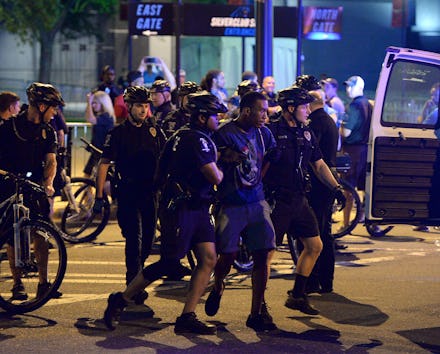Charlotte PD Considers Banning People From Certain Neighborhoods If They've Been Arrested

Police and city councilors in Charlotte, North Carolina, are debating whether to ban people from being in certain parts of the city if they've ever been arrested. Police would designate the restricted spaces — generally high-crime areas — as "public safety zones," and bar those who had previously been arrested in the areas from entering.
Former arrestees would face misdemeanor charges if they entered the zones, the Charlotte Observer reports. To qualify for a ban, one need not have to have been tried, convicted or incarcerated for a crime — simply arrested.
Neither the Charlotte-Mecklenburg Police Department nor the Charlotte City Council responded to Mic's request for comment Thursday.
Under the proposed rule, police could designate public safety zones in response to activities like drug sales and weapon discharges. They could then send notifications to people who had been arrested in these areas previously, and ban them from entry as long as the area remained designated as such.
The bans "could be appealed" by people picking up children from school or going to work in the zones, according to the Charlotte Observer.
Comprehensive arrest numbers were not readily available for this report, but since 1999, North Carolina has mandated that all law enforcement departments statewide collect data on traffic stops. According to a study from the University of North Carolina at Chapel Hill, black motorists were both more likely to be stopped and twice as likely to be searched after being stopped by the Charlotte-Mecklenburg police compared to white motorists between 2002 and 2013.
North Carolina Department of Justice data also show that black motorists were more likely to be arrested after a stop between October 2010 and August 2015 — the broadest dataset available.
According to census figures from 2014, black people constitute 32.2% of residents in Mecklenburg County — over which the Charlotte-Mecklenburg Police Department has jurisdiction — while white people compose 59.2%.
It's not hard to guess who would be most affected by proposed "public safety zones," considering these numbers.
This is also not the first time Charlotte has suggested a measure like this. According to the Charlotte Observer, a 2013 injunction against the Hidden Valley Kings gang prohibited its members from "driving, standing, sitting, walking or appearing together in public view." The injunction expired last year, but authorities are could technically renew it.